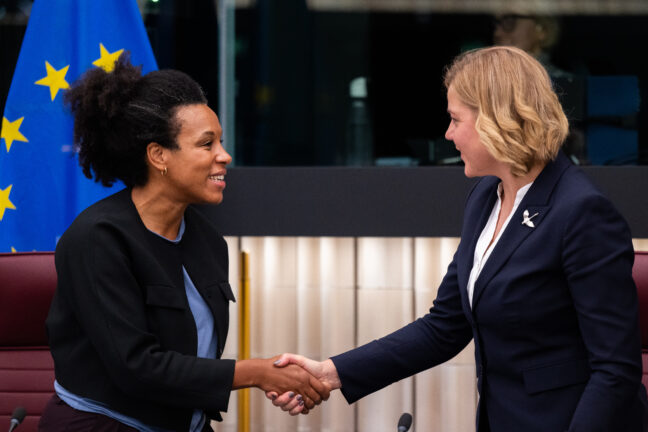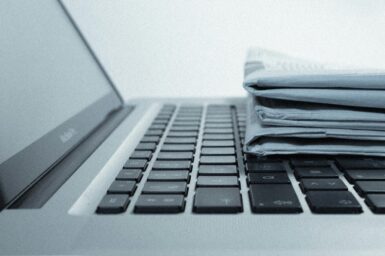The European Commission’s media portfolio is heading for a crunch year in 2026, when Brussels plans to revise both the Audiovisual Media Services Directive and the Copyright laws. Together, the reviews will update Europe’s ambitions with the realities of platform power and AI content.
Speaking to MEPs in the Parliament’s CULT (Culture and Education) Committee this week, Commissioner Henna Virkkunen said the media and creative sectors “at the heart of our democracies” were “under pressure”. She outlined the Commission’s 2025–26 agenda, calling enforcement of the Media Freedom Act “a top priority” and stressing the need to keep EU legislation fit for purpose in a rapidly digitalising environment.
Revising the media rulebook
Two of the EU’s cornerstone media laws, the Audiovisual Media Services Directive (AVMSD) and the Copyright Directive, are under review, with changes to come next year. They will determine how Europe adapts its media framework to streaming platforms, new formats, and the growing impact of AI.
Ms Virkkunen told MEPs that the AVMSD has been “very successful thanks to the European content quota of at least 30 per cent”. This refers to the rules that mandate member states must ensure that on-demand audiovisual services devote at least 30 per cent of their catalogues to European works and give them prominence. But with content increasingly curated by algorithms, the Commission wants to know whether these quotas still work.
We need a framework that fosters innovation and AI in Europe while at the same time making sure that creators can control the use of their works.— EU Commissioner Henna Virkkunen
“We are now in the process of assessing the impact of the current directive, and by December 2026, we will present an evaluation report and the proposal for review,” Ms Virkkunen said. “With the review, we should take into account new challenges such as the importance of European content of general interest, fair advertising and also new technologies and new players such as influencers.”
AI not addressed
The upcoming review of the Copyright Directive will run in parallel. The current framework, drafted before the rise of AI, allows text-and-data mining for research and innovation unless rights-holders opt out. “We need a framework that fosters innovation and AI in Europe while at the same time making sure that creators can control the use of their works,” said the Commissioner.
According to the European Parliamentary Research Service, current law “does not yet fully address issues related to AI models and intellectual property”. Under the legislation, creators can explicitly opt out of data mining. However, in practice, most online material remains open for AI training by default.
You might be interested
The Parliament’s Legal Affairs Committee has called for a “fair balance” between creative rights and technological progress. Their report suggests a European system for licensing and transparency. Proposed tools include automatic licensing mechanisms, machine-readable opt-out signals, and registers of training data.
New EMFA guidelines for social media
Already on the table is the European Media Freedom Act, in force since August of this year. The regulation is designed to safeguard journalists and news organisations, yet enforcement remains uneven. Several member states were flagged as not ready to implement the law.
Ms Virkkunen told MEPs that the Commission intends to close that gap and called enforcement “a top priority”. She announced that the Commission will publish guidelines by the end of the year, focusing on ” the self-declaration functionality for media service providers”. The aim is to ensure that outlets “fully benefit from the media content-moderation safeguards provided by the MFA, such as the 24 hours to oppose the planned content removal.”
“[Piracy] is a very worrying phenomenon, not only for sports events but also for the arts” — MEP Bogdan Zdrojewski (EPP/POL)
The CULT hearing also revived concerns about online piracy. MEP Bogdan Zdrojewski (EPP/POL) urged the Commission to act on its own findings. “In one month, the Commission should publish the assessment of the efficiency of its recommendation on piracy online,” he said. “It’s a very worrying phenomenon, not only for sports events but also for the arts.”
Piracy back on Brussels’ radar
The commissioner acknowledged the problem and said the Commission’s two-year assessment is in its final stage. “Online piracy continues to be a very serious threat for the creative sectors, in particular in the audiovisual sector, causing significant loss of revenue for broadcasters and other right-holders,” she said. The commissioner also hinted that EU-level action cannot be excluded if voluntary cooperation fails to reduce losses.
According to the European Union Intellectual Property Office (EUIPO), digital piracy costs the EU’s creative industries over €1bn a year. Television content and live sports account for nearly half of all illegal consumption. EUIPO also identifies economic pressures, limited access to affordable legal content, and low awareness of intellectual property rights as key drivers.











